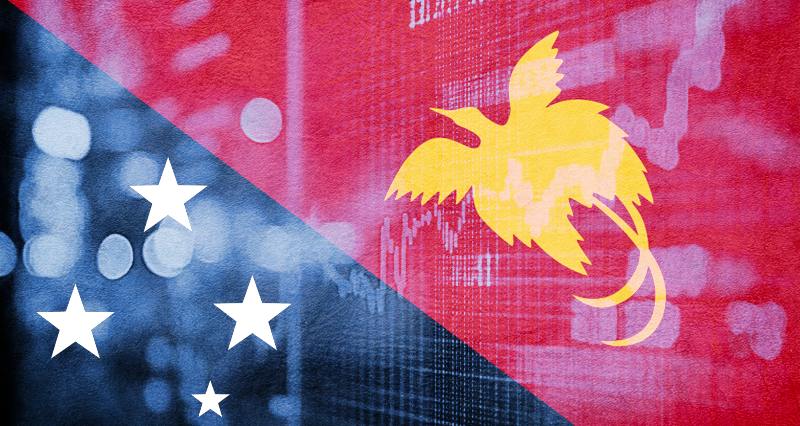Economic Pressures and Enacting Reforms
Economic Pressures and Enacting Reforms
By Mehmet Enes Beşer
In January 2024, Papua New Guinea (PNG) was rocked by mass civil unrest, as riots erupted in the national capital of Port Moresby and spread to other towns. The immediate cause was an instantaneous reduction in the pay of public servants, attributed by the government to a “technical glitch” in the payroll system. This was followed by protests from the security forces, which escalated into mass arson and looting, and caused the deaths of at least 16 individuals and prompted the government to institute a state of emergency.
Root Causes of the Unrest
Salary deductions were the precipitating cause, but socioeconomic reasons were the reason for the unrest. Unbridled inflation, increasing unemployment, and high corruption have eroded citizens’ confidence in government institutions. Inflation has averaged 5% annually over the last decade, eroding the real purchasing power of wages. Formal sector jobs were at a peak of 300,000 in 2013 but fell to below 270,000 notwithstanding a population increase of about 30%. These economic issues have been compounded by a failure to diversify the economy, with too little development taking place in the agricultural, fisheries, forestry, and tourism sectors.
Government Response and Reforms
The PNG government learned after the riots that it had to implement extensive reforms to address the systemic causes. This is already being seen in the 2025 national budget, where proper provisions have been made to set up security, health, and infrastructure. Particularly, the budget has been boosted by 20% through provincial channels to facilitate service delivery at the base level.
Also, the government recognized that political reforms had to be instituted so that governance can be consolidated. Efforts are being undertaken to render the parliament more independent, transcending the quest for political stability to the practice of effective checks and balances on the executive. This involves the reengineering of the role of Members of Parliament in providing services, which is a source of misallocation of resources and undermining of parliamentary oversight.
Economic Outlook and Challenges
Economically, PNG increased in 2024, in part due to the re-opening of the Porgera gold mine, which stimulated gold output and exports. Growth in 2025 is, however, expected to decline as the initial stimulus effect of the re-opening of the mine wears off. While the liquefied natural gas (LNG) sector continues to be a major revenue earner from exports, the country is finding it difficult to re-acquire competitiveness in cash crops like cocoa and coffee, especially with stabilized global prices.
To address such issues, the government is making efforts to achieve a more secure and appealing climate for investment. Reforms are being undertaken in order to make policies uniform and comprehensible for the purpose of attracting investment across all sectors, including state-run enterprises. They also aim at promoting clean and green energies for the purpose of ensuring a balanced energy mix as well as a decrease in dependency on conventional fossil fuels.
Security Issues and Social Stability
Aside from economic reform, PNG must address internal security. The recent tribal war in provinces like the Enga province came at a heavy price, a testament to the recurring theme of tribal war. Inter-tribal fighting in Porgera among up to 17 tribes resulted in approximately 30 deaths, a testament to why ending local battles is crucial for the stability of the nation.
The urban centers are also experiencing security concerns, and the gang rape and killing of Margaret Gabriel in Port Moresby brought into prominence gender violence widespread in Papua New Guinea. The offense led police sweeps of squatter settlements that were connected with high crime rates, feeding into deeper concerns about urbanization and public service deficiencies.
International Support and Regional Dynamics
Embracing regional interdependence in security, Australia launched a $400 million Pacific Policing Initiative aimed at strengthening policing capacity across the Pacific region, including PNG. The desire is to repel external power and increase Pacific Island nations’ sovereignty and security. The move aims to establish swift response capabilities and training schools within PNG, Fiji, and Samoa, revealing concern for stability within the region.
Conclusion
Papua New Guinea is at a policy crossroads, faced with twin imperatives of addressing near-term socio-economic demands and longer-term structural change. The 2024 riots reminded brutally enough of seething tensions that could otherwise spill over when underlying root causes are not addressed. The state’s economic diversification, political accountability, and social stability reform program is one towards progress. But the success of these reforms will be contingent upon how effectively they are implemented, on responsive inclusive policies to the diverse needs of PNG’s people, and on continued international support. By confronting challenges squarely, opportunities can be made for a more prosperous and secure future for PNG.

















Leave a Reply